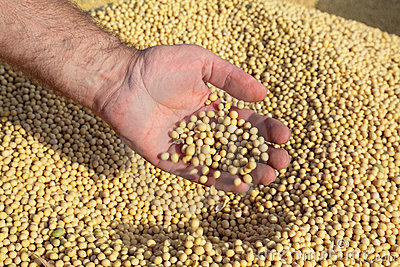
Agricultural News
Biotech Approvals, Acceptance on Docket of Biotech Roundtable
Thu, 14 Aug 2014 14:54:41 CDT

The American Soybean Association (ASA) and the Illinois Soybean Association (ISA) teamed up in Washington this week to bring together more than 100 farmers, researchers, leaders of agricultural organizations and federal officials to discuss the worldwide benefits of agricultural biotechnology, focusing on acceleration of government approval of biotech seed for soybeans and other crops.
This D.C. Biotechnology Roundtable is the latest in a series of forums ISA has organized to help advance a more science-based biotech approval process and to reinforce the proven safety of agricultural biotechnology, which farmers use to enhance the yields and quality of soybeans and other crops.
"It is critical that agriculture let policymakers and regulators in Washington know how much farmers need biotechnology to sustainably produce food for the world's population. Scientists and regulatory agencies have established that agricultural biotechnology is safe for humans, animals and the environment. It is crucial science that helps farmers use less resources to produce more food," says Bill Raben, soybean farmer from Ridgway, Ill., and ISA chairman.
Darci Vetter, chief agricultural negotiator for the U.S. Trade Representative delivered the keynote address. Other regulatory speakers included Dan Kenny, Environmental Protection Agency, Michael Firko, U. S. Department of Agriculture, and Jack Bobo, U.S. Department of State. Additional speakers include Michael Hawkins, Embassy of Canada, David Zilberman, University of California; Jim Sutter, U.S. Soybean Export Council, and ASA CEO Steve Censky. Firko talked about the progress USDA is making in clearing the backlog of approval of new biotechnology designed to help crops withstand pests, disease and harsh climate and to use crop nutrients more efficiently.
Zilberman said that approvals for new biotechnology traits for soybean seed can take 10-15 years, pushing costs as high as $160 million to commercialize new biotechnology.
A panel of farmers, Ron Moore, representing ISA and ASA; Jim Zimmerman, of Wisconsin, of the National Corn Growers Association, and Brett Blankenship, Washington State, representing the National Association of Wheat Growers, shared examples of the value of biotechnology and the need for collaboration across agriculture and government to make biotech crops available to farmers and food companies. The farmers emphasized that biotechnology should be viewed as a viable choice for those who see its benefits including consumers and farmers.
Robert Paarlberg, renowned author and advisor to numerous food and agricultural organizations worldwide, reiterated the proven safety of biotechnology. A professor of political science at Wellesley College and public policy at Harvard University's Weatherhead Center for International Affairs, Paarlberg observed that opposition to biotechnology comes from environmental and anti-globalization groups in more affluent countries, particularly the European Union. He said the current state of worldwide regulation deprives people of food by preventing use of biotechnology by farmers in poorer countries who are growing food crops such as wheat, rice and potatoes, and making the technology available only to farmers in affluent countries, such as the United States, who raise biotech crops, such as soybeans and corn for livestock feed.
Hosted by ISA and ASA, the meeting was sponsored by DuPont Pioneer, Monsanto, the New York Corn & Soybean Association, U.S. Soybean Export Council, FLM+, Indiana Soybean Alliance, National Association of Wheat Growers, Indiana Corn Marketing Council, National Corn Growers Association, Dow AgroSciences and Ohio Soybean Council.
For a full agenda visit this website click here .
WebReadyTM Powered by WireReady® NSI
Top Agricultural News
More Headlines...



















